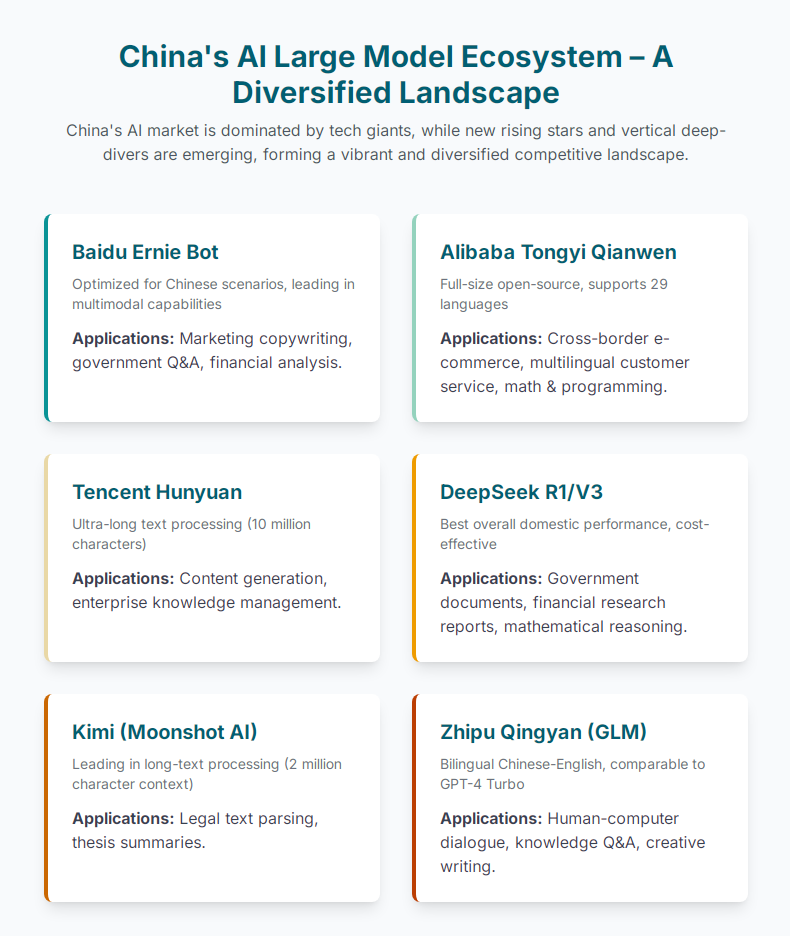Western Businesses and China GEO Practices in China
This focuses on how Western businesses can effectively implement Generative Search Engine Optimization (GEO) within China’s rapidly evolving AI large model ecosystem, drawing insights from the provided report.
Navigating China’s AI Landscape and Data Ecosystem
China’s AI large model development is characterized by a “giant dominance + rising stars + industry deep cultivation” pattern, led by major tech companies like Baidu, Alibaba, ByteDance, iFlytek, Tencent, and Huawei, alongside innovative startups and specialized vertical models. A key differentiator is China’s national strategic approach to AI corpus construction, aiming for high-quality, authoritative, and publicly accessible Chinese corpora. This top-down effort creates a data ecosystem where Chinese large models possess a deeper, more nuanced understanding of Chinese language, culture, and specific social norms, potentially forming a “data moat” in the domestic market. For Western businesses, this means content for Chinese AI platforms requires deep cultural and contextual adaptation, not just simple translation.

Generative Search Engine Optimization (GEO): A Paradigm Shift
GEO is a critical content optimization strategy for AI conversational platforms, shifting the focus from merely “ranking on the first page of search engines” to “becoming part of AI answers” and “being cited and recommended by AI.” AI models, especially in generative search, prioritize high-quality, authoritative, and well-structured content, including specific data, case studies, clear Q&A formats, and credible sources. The E-E-A-T principle (Experience, Expertise, Authoritativeness, Trustworthiness) is paramount for content to gain AI’s favor.
A significant challenge in AI search is the “trust deficit,” where AI models can “hallucinate” or present commercially influenced content without transparency. Western businesses must prioritize verifiable, transparent, and genuinely useful content, emphasizing E-E-A-T, clear citations, and potentially advocating for industry standards around disclosing AI-generated commercial content. The goal is to appear credibly, not just visibly.
Practical GEO Strategies for Western Businesses
To succeed with GEO in China, Western businesses must fundamentally rethink their content creation and publishing processes, structuring content for machine readability and extractability.
1. Organizing and Publishing High-Quality Enterprise Content:
Understand User Intent & Long-Tail Keywords: User search behavior in the AI era leans towards full sentences and complex queries. Businesses should identify “contextual keywords” and “specification recommendation keywords” (long-tail keywords) and proactively answer these questions with complete solutions, detailed comparisons, or product features. Professional FAQ sections based on real consumer questions are highly recommended.
Build Topical Authority and Content Clusters: Instead of optimizing for single keywords, create content clusters around core themes. This involves establishing a “pillar page” (authoritative guide) and multiple “cluster pages” (delving into sub-topics), connected by strategic internal linking. Regular content updates are crucial to ensure freshness and relevance.
Multimedia Content Optimization & Structured Data: AI models are increasingly multimodal. Include high-quality, optimized images and videos with detailed alt text and descriptions. Implement JSON-LD structured data markup for key elements (e.g., product specifications, prices, addresses) to help AI efficiently understand and extract information, improving “machine readability.”
2. Technical Optimization Practices:
Native HTML Output and SSR/Pre-rendering: Ensure critical SEO elements (title tags, meta descriptions, structured data, main content) are directly present in the raw HTML source code, not injected via JavaScript. Server-Side Rendering (SSR) or pre-rendering techniques can help LLM search platforms retrieve data more effectively.
Sitemap Management and Index Status Checks: Regularly update and submit sitemaps to Google and relevant Chinese LLM search platforms that support API submission. Utilize tools to monitor index status and confirm AI citation.
Control Content Dynamism: Pages heavily reliant on JavaScript are less friendly to search bots. Staticize non-essential information to improve rendering efficiency and ensure AI crawlers can easily discover content.
Cross-Industry Relevance and Future Outlook
GEO strategies are applicable across various industries:
- Financial Services: Optimize whitepapers and industry reports with structured data and E-E-A-T for AI to use in financial analysis and investment insights.
- Healthcare: Publish clinical guidelines, research papers, and patient education materials on authoritative platforms with clear structures and expert authorship for AI models to retrieve for diagnostic or treatment recommendations.
- Manufacturing: Publish technical specifications, maintenance manuals, and operational best practices, optimizing them with structured data and concise language for AI-assisted fault diagnosis and predictive maintenance.
- Retail & E-commerce: Detail product information, FAQs, and customer support content to ensure AI models accurately answer product queries and provide personalized recommendations.
- Content Marketing & Enterprise Knowledge Base: Leverage GEO services to ensure brand prominence in AI search results by crafting high-quality content with specific data, case studies, and authoritative sources aligned with LLM preferences.
Strategic Recommendations for Western Businesses
Western businesses must adopt proactive, prudent, and adaptive strategies:
- Active Engagement and Understanding: Deeply understand the Chinese AI ecosystem, including its technical characteristics, data preferences, and policy orientations, potentially through partnerships.
- Data Governance and Quality: Invest in data governance frameworks, cleaning tools, and semantic markup to ensure proprietary information is AI-ready.
- Ethical AI Development: Adhere to responsible AI principles (transparency, explainability, fairness, privacy). Disclose AI-assisted content in GEO practices to build user trust and comply with future regulations.
- Continuous Adaptation and Learning: Establish mechanisms for continuous learning and adaptation to the rapidly evolving AI field.
- Adopt Hybrid AI Strategies: Combine RAG (for dynamic, real-time updates) and fine-tuning (for deep domain expertise and proprietary knowledge) to build robust and responsive AI systems.
By effectively navigating the “knowledge sources” of Chinese AI large models and presenting information in an AI-friendly manner through robust GEO practices, Western businesses can achieve significant growth and innovation in China’s emerging digital economy.
